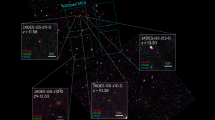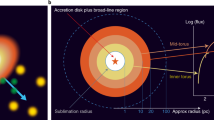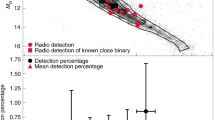Abstract
THE identification of southern hemisphere radio sources is in progress at the Yale University Observatory. The first epoch plates of the Yale–Columbia programme for determining the proper motion of southern stars have been examined for identifications, and I have already reported forty-one suggested identifications1, discussing the method and techniques in detail. In this communication I wish to point out that two radio sources, PKS 0320-37 and 1302-49, usually identified with the galaxies NGC 1316 and NGC 4945, may instead be quasi-stellar sources in the direction of those galaxies.
This is a preview of subscription content, access via your institution
Access options
Subscribe to this journal
Receive 51 print issues and online access
$199.00 per year
only $3.90 per issue
Buy this article
- Purchase on Springer Link
- Instant access to full article PDF
Prices may be subject to local taxes which are calculated during checkout
Similar content being viewed by others
References
Lü, P. K., Astron. J. (in the press).
Bolton, J. G., Gardener, F. F., and Mackey, M. B., Austral. J. Phys., 17, 340 (1964).
Shimmins, P. J., Clarke, M. E., and Ekers, R. D., Austral. J. Phys., 19, 649 (1966).
Ekers, R. D., Austral. J. Phys., Suppl. No. 6 (1969).
Author information
Authors and Affiliations
Rights and permissions
About this article
Cite this article
LÜ, P. Quasars or Blue Stars ?. Nature 229, 477–478 (1971). https://doi.org/10.1038/229477a0
Received:
Issue Date:
DOI: https://doi.org/10.1038/229477a0
This article is cited by
-
Optical Identification of PKS 0320–37
Nature (1971)
Comments
By submitting a comment you agree to abide by our Terms and Community Guidelines. If you find something abusive or that does not comply with our terms or guidelines please flag it as inappropriate.



